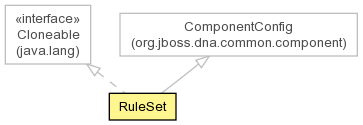 org.jboss.dna.common.component.ComponentConfig
org.jboss.dna.common.component.ComponentConfig
 org.jboss.dna.repository.rules.RuleSet
org.jboss.dna.repository.rules.RuleSet
|
|||||||||
| PREV CLASS NEXT CLASS | FRAMES NO FRAMES | ||||||||
| SUMMARY: NESTED | FIELD | CONSTR | METHOD | DETAIL: FIELD | CONSTR | METHOD | ||||||||
java.lang.Objectorg.jboss.dna.common.component.ComponentConfig
org.jboss.dna.repository.rules.RuleSet
@Immutable public class RuleSet

A description of a set of rules compatible with a JSR-94 rule engine.
| Constructor Summary | |
|---|---|
RuleSet(String name,
String description,
String classname,
String[] classpath,
String providerUri,
String ruleSetUri,
String rules,
Map<String,Object> properties)
Create a JSR-94 rule set definition. |
|
| Method Summary | |
|---|---|
RuleSet |
clone()
|
Map<Object,Object> |
getExecutionSetProperties()
Get the properties for this rule set that can be passed to an RuleExecutionSetProvider's
createRuleExecutionSet method. |
Map<String,Object> |
getProperties()
Get this rule set's properties as an unmodifiable map. |
String |
getProviderUri()
Get the URI of the JSR-94 RuleServiceProvider implementation that should be used. |
String |
getRules()
Get the rules defined in terms of the language reqired by the provider. |
String |
getRuleSetUri()
Get the URI of this rule set. |
boolean |
hasChanged(ComponentConfig obj)
Determine whether this component has changed with respect to the supplied component. |
| Methods inherited from class org.jboss.dna.common.component.ComponentConfig |
|---|
compareTo, equals, getComponentClassname, getComponentClasspath, getComponentClasspathArray, getDescription, getName, getTimestamp, hashCode |
| Methods inherited from class java.lang.Object |
|---|
getClass, notify, notifyAll, toString, wait, wait, wait |
| Constructor Detail |
|---|
public RuleSet(String name,
String description,
String classname,
String[] classpath,
String providerUri,
String ruleSetUri,
String rules,
Map<String,Object> properties)
name - the name of the rule set, which is considered the unique identifierdescription - the descriptionclassname - the name of the Java class used for the componentclasspath - the optional classpath (defined in a way compatible with a ClassLoaderFactoryproviderUri - the URI of the JSR-94 RuleServiceProvider implementation to useruleSetUri - the URI of the JSR-94 RuleExecutionSet represented by this object; if null, the name is usedrules - the string containing the rules in a provider-specific languageproperties - the provider-specific properties, whose values should be strings or byte arrays (the latter if the
provider expects an Reader with the value)
IllegalArgumentException - if any of the name, classname, provider URI, or rules parameters are null, empty or blank,
or if the classname is not a valid Java classname| Method Detail |
|---|
public String getProviderUri()
RuleServiceProvider implementation that should be used.
public String getRuleSetUri()
RuleExecutionSet.
public String getRules()
provider.
public Map<String,Object> getProperties()
passed literally, or a byte array if the value is to be
passed as an InputStream.
public Map<Object,Object> getExecutionSetProperties()
RuleExecutionSetProvider's
createRuleExecutionSet method.
This method converts any byte array value in the properties into an Reader. Since
ByteArrayInputStream is used, there is no need to close these stream.
public boolean hasChanged(ComponentConfig obj)
equals only checks the type and ComponentConfig.getName().
hasChanged in class ComponentConfigobj - the component to be compared with this one
public RuleSet clone()
clone in class Object
|
|||||||||
| PREV CLASS NEXT CLASS | FRAMES NO FRAMES | ||||||||
| SUMMARY: NESTED | FIELD | CONSTR | METHOD | DETAIL: FIELD | CONSTR | METHOD | ||||||||